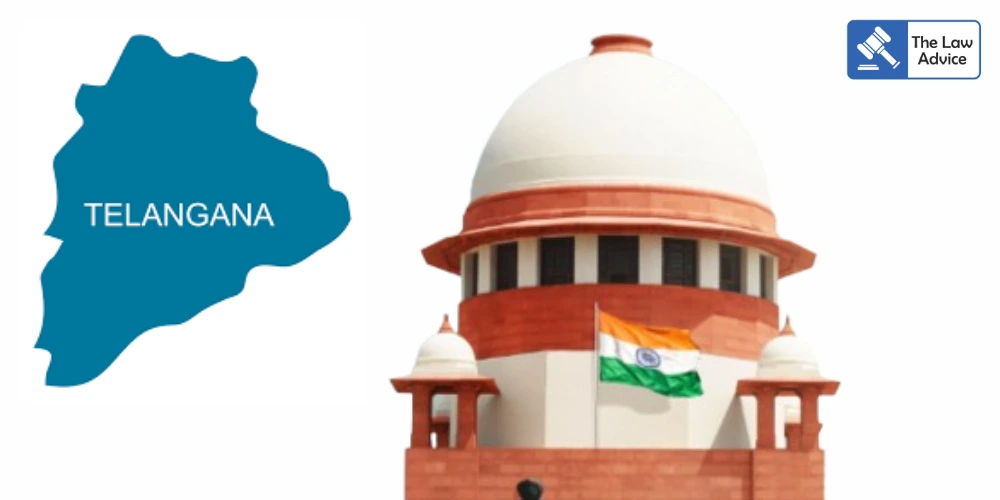The Supreme Court of India has upheld the validity of the Telangana Medical and Dental Colleges Admission Rules, 2017, which require candidates seeking admission under the local candidate quota in MBBS and BDS courses to have completed four consecutive years of study in Telangana. However, the Court also accepted a 2024 amendment carving out relaxations for children of government servants, defence personnel, and employees of transferable services, who may have had to study outside the State due to their parents’ postings.
A Bench comprising
Chief Justice of India B.R. Gavai and Justice K. Vinod Chandran allowed the appeal filed by the State of Telangana, setting aside the Telangana High Court’s decision which had read down the domicile requirement and held that permanent residents should not be compelled to meet the four-year study/residence condition.
Under Rule 3(a) of the 2017 Rules, as amended by G.O. No. 33 dated July 19, 2024, candidates applying under the Competent Authority Quota (85% seats reserved for “local candidates”) must:
1. Study in Telangana for four consecutive academic years immediately preceding the qualifying examination; or
2. Reside in Telangana for a period of four years before the qualifying examination; and
3. Pass the qualifying examination from Telangana.
The 2017 Rules were challenged before the High Court of Telangana by a group of students, who argued that the continuous study requirement unfairly excluded permanent residents of Telangana whose parents’ employment forced them to live outside the State. The High Court in November 2024, in a judgment by Chief Justice Alok Aradhe and Justice J. Sreenivas Rao, “read down” Rules 3(a) and 3(iii), holding that permanent residents could not be deprived of the quota merely for want of four consecutive years of study in the State.
The State appealed to the Supreme Court, asserting that the domicile rule was necessary to protect disadvantaged sections of Telangana who lacked the resources to study outside the State.
The 2024 Amendment: Relaxation for Children of Transferrable Employees
During the litigation, the State of Telangana introduced an amendment in July 2024 (via G.O. 33) to address genuine hardships faced by families in transferrable jobs. The amendment provides that even if a candidate studied outside Telangana during the four-year period, they may still be considered local if they fall under any of the following categories:
1. Children of Telangana State Government employees serving outside Telangana.
2. Children of serving/retired All India Services officers (IAS/IPS/IFS) of Telangana cadre posted outside Telangana.
3. Children of defence personnel, ex-servicemen, or Central Armed Police Force personnel who declared Telangana as their hometown at the time of joining.
4. Children of employees of Telangana Government corporations, agencies, or instrumentalities liable to transfer anywhere in India.
Such candidates must produce an employment certificate of the parent corresponding to the period of study outside Telangana.
The Court examined the Presidential Order issued under Article 371D of the Constitution, which permits States like Telangana to provide local preference in admissions to professional courses.
Justice Chandran, writing the judgment, held that both the pre-amended and amended rules were consistent with the Presidential Order and long-standing precedents:
“We have already held that the pre-amended rule defining a local candidate was perfectly in order, which reasoning applies squarely to the amended rule also. There was no warrant for a reading down when the definition is clear, in consonance with the Presidential Order and similar rules having been upheld by this Court as coming out from binding precedents.”
The Bench noted that 15% of medical seats are already surrendered to the All-India Quota and emphasized that the remaining 85% local quota could be legitimately regulated by the State through a strict residence/study requirement, subject to reasonable relaxations.
Disagreeing with the Telangana High Court, the Supreme Court:
• Restored the four-year continuous study/residence rule as the test for determining local candidate status.
• Upheld the 2024 amendment granting exemptions for children of transferrable government and defence personnel.
• Rejected the High Court’s view of introducing a separate “permanent resident” category, holding that such a reading down was neither warranted nor consistent with the scheme of Article 371D.
Appearances
• For the State: Senior Advocates Dr. Abhishek Manu Singhvi, Gopal Sankarnarayanan, A. Sudarshan Reddy.
• For the students: Senior Advocates P.B. Suresh, Raghenth Basant, Prakash Deu Naik, Krishna Dev Jagarlamudi.
• For the impleader: Senior Advocate S. Sriram.
Case Details
• Case Title: The State of Telangana and Ors. v. Kalluri Naga Narasimha Abhiram and Ors.
• Case No.: SLP(C) Nos. 21536-21588/2024
• Bench: CJI B.R. Gavai, Justice K. Vinod Chandran
